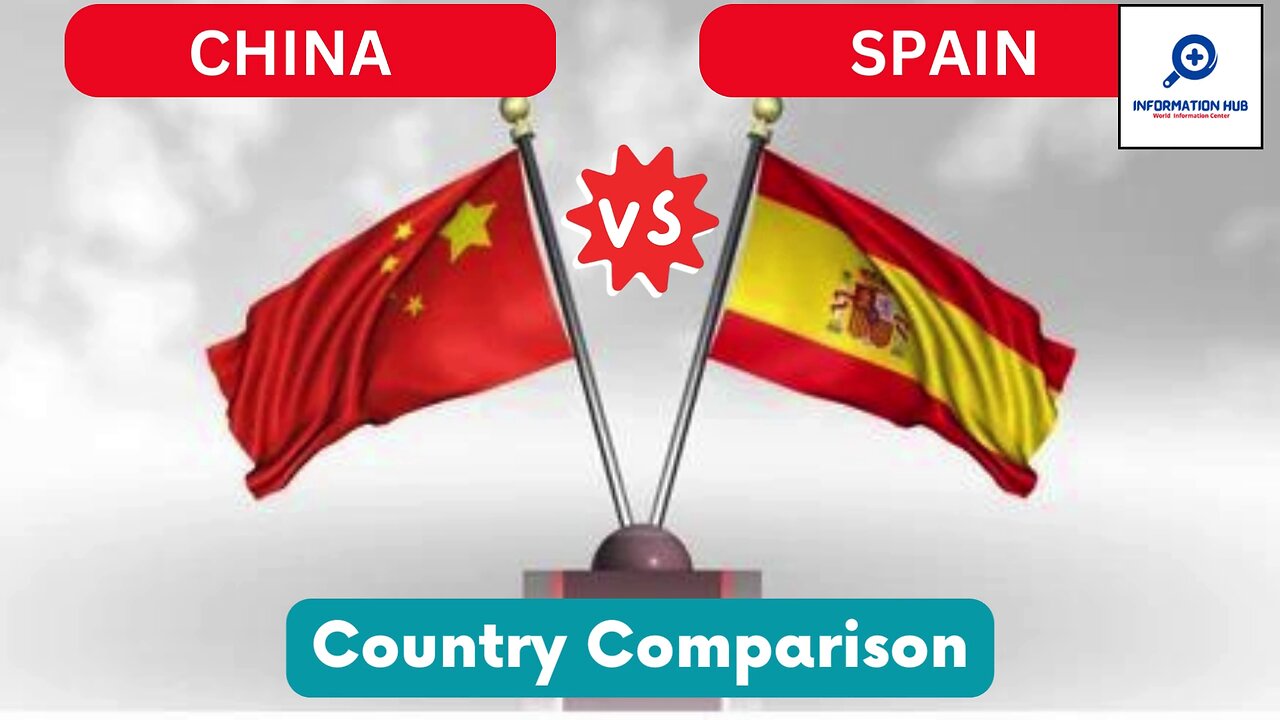Premium Only Content

China vs Spain - Country Comparison 2024 ll Spain ll China ll Information Hub
Spain vs China - Country Comparison 2023
#china #spain #countriescomparison #information #shangai #madrid #countriescomparisonstats #informationhub
Land Area, Government, Economy, Military, Gdp, Export, Import, Olympic Medals, National Animal, National Bird, Best Dishes, Largest Company, Productions, Tourism, Internet Users etc.....
Which Country do you Think is More Influential?
Share Your Views in the comment section down below.
Please review the contents.
Your opinion matters Thank you for your support.
Subscribe for World informative Videos and press the bell icon
China (Chinese: 中国; pinyin: Zhōngguó), officially the People's Republic of China (PRC), is a country in East Asia. It is the world's most populous country, with a population exceeding 1.4 billion. China spans the equivalent of five time zones and borders fourteen countries by land, the most of any country in the world. With an area of approximately 9.6 million square kilometres (3,700,000 sq mi), it is the world's third largest country by total land area. The country consists of 22 provinces, five autonomous regions, four municipalities, and two special administrative regions (Hong Kong and Macau). The national capital is Beijing, and the most populous city and largest financial center is Shanghai.
Modern Chinese trace their origins to a cradle of civilization in the fertile basin of the Yellow River in the North China Plain. The semi-legendary Xia dynasty in the 21st century BCE and the well-attested Shang and Zhou dynasties developed a bureaucratic political system to serve hereditary monarchies, or dynasties. Chinese writing, Chinese classic literature, and the Hundred Schools of Thought emerged during this period and influenced China and its neighbors for centuries to come. In the third century BCE, Qin Shi Huang founded the first Chinese empire, the short-lived Qin dynasty. The Qin was followed by the more stable Han dynasty (206 BCE–220 CE), which established a model for nearly two millennia in which the Chinese empire was one of the world's foremost economic powers. The empire expanded, fractured, and reunified; was conquered and reestablished; absorbed foreign religions and ideas; and made world-leading scientific advances, such as the Four Great Inventions: gunpowder, paper, the compass, and printing. After centuries of disunity following the fall of the Han, the Sui (581–618) and Tang (618–907) dynasties reunified the empire.
Spain (Spanish: España, [esˈpaɲa] ), or the Kingdom of Spain (Reino de España), is a country located in Southwestern Europe, with parts of its territory in the Atlantic Ocean, the Mediterranean Sea and Africa. It is the largest country in Southern Europe and the fourth-most populous European Union member state. Spanning across the majority of the Iberian Peninsula, its territory also includes the Canary Islands in the Atlantic Ocean, the Balearic Islands in the Mediterranean Sea, and the autonomous cities of Ceuta and Melilla in Africa. Peninsular Spain is bordered to the north by France, Andorra, and the Bay of Biscay; to the east and south by the Mediterranean Sea and Gibraltar; and to the west by Portugal and the Atlantic Ocean. Spain's capital and largest city is Madrid; other major urban areas include Barcelona, Valencia, Zaragoza, Seville, Málaga, Murcia, Palma de Mallorca, Las Palmas de Gran Canaria, and Bilbao.
In early antiquity, the Iberian Peninsula was inhabited by a mixture of Iberian and Celtic tribes, along with other local pre-Roman peoples. With the Roman conquest of the Iberian Peninsula, the province of Hispania was established. Following the Romanization and Christianization of Hispania, the fall of the Western Roman Empire ushered in the inward migration of tribes from Central Europe, including the Visigoths, who formed the Visigothic Kingdom centred on Toledo. In the early eighth century, most of the peninsula was conquered by the Umayyad Caliphate, and during early Islamic rule, Al-Andalus became a dominant peninsular power centred in Córdoba. Several Christian kingdoms emerged in Northern Iberia, chief among them Asturias, León, Castile, Aragon, Navarre, and Portugal; made an intermittent southward military expansion, known as the Reconquista, repelling Islamic rule in Iberia, which culminated with the Christian seizure of the Nasrid Kingdom of Granada in 1492.
-
 LIVE
LIVE
Quite Frankly
7 hours ago"Ghosts, Robotics, and OBE's" ft. Dr. Albert Taylor 2/21/25
776 watching -
 LIVE
LIVE
LFA TV
23 hours agoMaking Germany Great Again | TRUMPET DAILY 2.21.25 7PM
272 watching -
 LIVE
LIVE
2 MIKES LIVE
2 hours ago2 MIKES LIVE #183 Open Mike Friday with Hannah Faulkner and Adelia Kirchner!
127 watching -
 12:09
12:09
MrBigKid
3 hours agoNew Mossberg 590R: Tactical Homestead Defender
1.03K1 -
 25:43
25:43
Degenerate Jay
8 hours agoThe Future Of Grand Theft Auto Online Looks Grim
6391 -
 1:04:05
1:04:05
In The Litter Box w/ Jewels & Catturd
23 hours agoYOU'RE FIRED! | In the Litter Box w/ Jewels & Catturd – Ep. 747 – 2/21/2025
80.3K33 -
 56:28
56:28
SGT Report
19 hours agoSATAN'S CHILDREN ARE IN FULL PANIC MODE - Senator Mark Finchem & Sam Anthony
26.1K104 -
 1:24:56
1:24:56
Revenge of the Cis
3 hours agoLocals Movie Riff: Soul Plane
41.6K1 -
 40:04
40:04
SLS - Street League Skateboarding
1 month agoThese 2 Women Dominated 2024! Best of Rayssa Leal & Chloe Covell 🏆
53.4K3 -
 1:48:12
1:48:12
The Quartering
7 hours agoElon Musk Waves a Chainsaw at CPAC, JD Vance SLAMS Illegal Immigration, and more
111K28